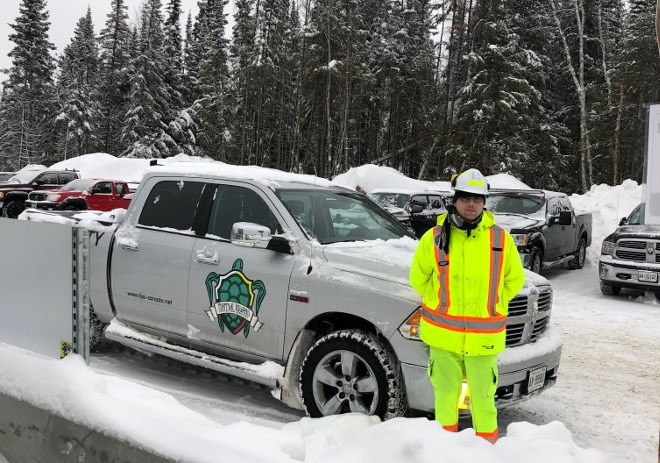Creating joint ventures with established business partners has been a viable approach Indigenous groups have taken to build expertise and experience to bid on large resource projects in First Nations territory.
But sometimes a partner doesn’t always hold up their end of the bargain.
In the case of three First Nation communities determined to start their own security firm, that’s where Daryn DesGrosseilliers entered the picture.
The 30-year veteran in private security and law enforcement was recruited by the communities of Beaver House, Wahgoshig and Matachewan First Nations to set up a new venture, Turtle Island Protection Services.
The fledgling security firm is jointly owned by the communities, with DesGrosseilliers holding a 10 per cent ownership stake.
Traditionally, the communities had been joint venturing with security companies to work at area mines through negotiated impact benefit agreements. But promises of employment and revenue failed to materialize.
“The intent has always been when they did their own joint venture that they’d eventually have their own security company set up, but that’s not really in the best interest of the joint venture partner and so it never really actually happens,” said DesGrosseilliers.
DesGrosseilliers, an Algonquin who grew up in Sudbury, followed in his father’s and uncle’s footsteps as a special constable with the Greater Sudbury Police Service before segueing into private investigations with Aboriginal Risk Services, offering security training to First Nations.
He prepared a business proposal for the three communities to establish their own company, but the leadership wanted him to come aboard as a partner to oversee it.
With a workforce of 18 full-timers and 30 to 40 part-time staff of Indigenous and Métis drawn from the partnering communities, DesGrosseilliers claims Turtle Island is the only Indigenous-owned, operated, and staffed security firm in Ontario.
The focus is on securing contracts in the mining, energy and cannabis/hemp sectors.
Turtle Island guards are not licensed to carry firearms but are capable of screening for workers entering a mine or work site, conducting internal investigations, carrying out site searches with drug-sniffing canines, and are trained in emergency first aid to serve as first responders.
In its short history, DesGrosseilliers said Turtle Island has performed work for Northern Sun Mining in Timmins, and is providing site security at Kirkland Lake Gold’s new shaft expansion at the Macassa Mine in Kirkland Lake.
Through impact benefit agreements, negotiations are underway with other mining companies within the communities’ territorial lands.
“We’re getting quite a bit of interest,” said DesGrosseilliers.
The company is also collaborating with the Nishnawbe Aski Police Service and Ontario Provincial Police in conducting community patrols of Wahgoshig and is working with Mushkegowuk Council on drug interdiction at ice road checkpoints.
“The communities are very receptive,” said DesGrosseilliers.
Turtle Island is also eyeing national expansion, particularly with increasing Indigenous participation and investment in commercial cannabis growing operations, not just in site security but in transportation of product.
“We’ve been talking to a few companies in designing their security around their facilities to grow marijuana and hemp,” he added.
DesGrosseilliers, who also works as the land, resources and forestry coordinator at Beaver House, said the future for Turtle Island looks extremely promising.
The firm has reached out and received interest from Indigenous communities to set up security firms in British Columbia and Voisey’s Bay, Labrador.
Turtle Island is licensed through the Ministry of Community Safety and Correctional Services, and provides the mandatory 40-hour security training and 50-hour investigative training.
The two-week training program can be delivered at a host First Nation.
“We do training for any First Nation people in Ontario who are interested and if they meet the right qualifications,” said DesGrosseilliers.
The prerequisites for training are possession of a secondary school diploma, a clean criminal record, and aptitude.
He welcomes trainees who view this as a stepping stone job to an eventual career in policing.
“That’s what I look for, people who are motivated and want to get into law enforcement.”
DesGrosseilliers said they have a proposal on tap to develop a virtual reality training component and roll it out to 11 communities in the Wabun and Mushkegowuk territories.
With the opening of Northern College’s Integrated Emergency Services Complex in Timmins, they hope to have discussions in 2019 to see how they can work together on the training or instructional front, said DesGrosseilliers.
“They have a whole slew of different courses that we can tap into and work together on.”
The Drift magazine, a new publication from Northern Ontario Business, features profiles on the people and companies making important contributions to the Northern Ontario mining service and supply industry.




